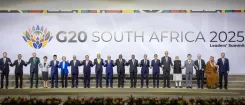Could Hydrogen Fuel Cell Buses Transform Ladakh’s Public Transport?

Synopsis
Key Takeaways
- Ladakh introduces hydrogen fuel cell buses as part of a green energy initiative.
- This marks a significant step towards renewable energy innovation in India.
- The project aims to cut down carbon emissions by 350 metric tonnes annually.
- Each bus can cover 230 km on a single charge.
- Fare will be comparable to traditional electric buses, benefiting passengers.
Leh, June 22 (NationPress) The Union Territory of Ladakh is poised to lead the green energy revolution in India by introducing the nation’s inaugural hydrogen fuel cell buses. Plans are underway for the official launch of these buses, with a trial operation expected to commence in Leh within the next couple of days.
In a recent ceremony, the National Thermal Power Corporation (NTPC) Limited handed over five hydrogen fuel cell buses to the State Industrial Development Corporation.
This initiative signifies the first commercial use of such buses in India. The operation of these clean energy buses on the world's highest motorable roads is a remarkable step towards achieving green mobility.
This unique initiative serves as a strong testament to India’s advancing role in renewable energy innovation and is in line with the government’s larger goal of attaining net-zero emissions. It is anticipated that the project will cut down carbon emissions by approximately 350 metric tonnes each year and generate 230 metric tonnes of pure oxygen, which is akin to planting nearly 13,000 trees.
As part of this project, NTPC has established a 1.7 MW solar power plant at Leh's highest elevation, 11,562 feet above sea level. This solar facility will produce hydrogen to fuel the buses.
Tashichojin, the operations manager of SIDCO in Leh, stated that they have received five buses so far and operations are planned for three routes.
“The bus service will launch on Monday or Tuesday. Initially, it will operate on a trial basis for a day or two, and if all goes well, regular service will commence,” he mentioned.
Tashichojin added that each bus accommodates 32 passengers and can travel approximately 230 km on a single charge. The fare for these buses will match that of electric buses, providing financial benefits to passengers.









